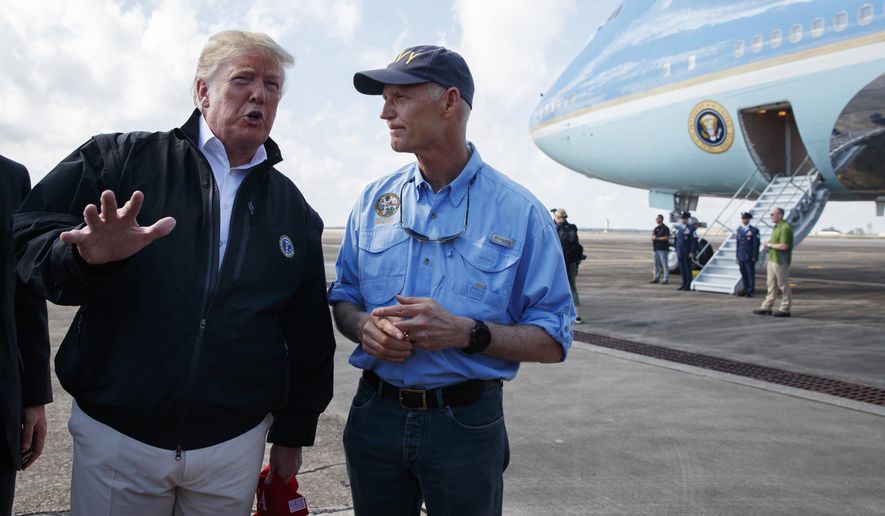A political storm and a storm of nature swept Florida in October, and it will take November to sort out which made more of an electoral difference.
In the final weeks before Tuesday’s election, President Trump and Hurricane Michael proved big players on the Sunshine State stage as voters there choose whether to send incumbent Democratic Sen. Bill Nelson back to Congress for a fourth term or to replace him with term-limited GOP Gov. Rick Scott.
The storm ravaged Florida’s northwestern bend and a good part of its Panhandle, the latter the source of roughly half of Mr. Scott’s 60,000 vote victory in his 2014 gubernatorial re-election. Michael provided Floridians with another chance to see Mr. Scott’s calm hand in a tempest and gave him oodles of positive airtime, but it also scattered one of his most reliable voting blocs and made politics a far less significant part of many lives there.
“His management of Hurricane Michael got good marks, although some discount its lasting impacts on voter choice,” said Susan MacManus, widely regarded as the dean of Florida political analysts. “We shall see.”
Meanwhile, President Trump, who has enthusiastically endorsed not just Mr. Scott, 65, but also the GOP nominee to replace him in the governor’s mansion, former Rep. Ron DeSantis, has lent his personal touch with visits, including one Saturday night in Pensacola, the Panhandle’s biggest city.
The Trump rallies underscored not only the importance both Republicans and Democrats have put on the Florida races, but also their closeness. When elections are decided by a mere percentage point — as most recent statewide Florida races have — then you want your top acts closing the deal.
For Democrats, that means left-wing Sen. Bernard Sanders of Vermont and former President Barack Obama.
Mr. Sanders stands solidly behind Tallahassee Mayor Andrew Gillum, the Democratic candidate for governor, who has adopted many of Mr. Sanders’ most left-wing positions as his own: government-sponsored health care, taxpayer-funded college, a 40 percent increase in the state’s corporate tax rate and a $15-an-hour minimum wage.
But that leftward tilt in the governor’s race has been a mixed opportunity for Mr. Nelson, 76.
On the one hand, he has welcomed the enthusiasm Mr. Gillum has reportedly engendered among young, liberal voters. On the other hand, Mr. Nelson has had to tiptoe between the left-wing and a more centrist approach politicians usually favor in tight races. He says he’d like to see an increase in the minimum wage, but not to $15, for example.
Still, the establishment of something like a ticket with Mr. Nelson and Mr. Gillum struck most analysts as a benefit.
“After the primary, money began to pour into the Nelson campaign from outside of Florida,” Ms. MacManus said, adding that Mr. Nelson’s “best move” was appearing on stage with the gubernatorial nominee and focusing on Democrats’ protection of pre-existing condition health care coverage.
The Scott campaign says Mr. Nelson has no real accomplishments of his own after nearly two decades in the Senate.
With a bulging campaign war chest supplemented by his personal fortune – he wrote checks to his campaign totaling more than $12 million since Oct. 22, records show – Mr. Scott was counting on riding a message of a strong economic record.
Michael tore everything apart.
Mr. Scott said he would suspend his campaign to focus on the needs of constituents, but Mr. Nelson, after a week-long hiatus, announced he had “done everything I could” on the recovery and returned to the campaign trail.
In the closing weeks, advertising for Mr. Scott then took on a softer edge, featuring his family and another strong pitch to Latino voters, especially Puerto Ricans who moved to Florida in the aftermath of their own storm nightmare with Hurricane Maria last year.
Not everyone thinks the move was successful.
“I must admit, I am a little surprised at Rick Scott’s newfound lack of message,” said Steve Vancore, a Democratic consultant in Tallahassee who has warned his party they need to find a message other than hatred of President Trump.
“He WAS the king of ’jobs, jobs, jobs,’” Mr. Vancore wrote in a campaign assessment. “He spent 8 years with no other message. Now, his team is very smart and I trust they know what they are doing, but it’s like they have the Tom Brady of messages and they are running the ball 50 plays a game. Not sure what to make of that.”
The governor’s close advisors, stunned at Mr. Scott’s decision to prioritize his duties to constituents above his political future, said they were inspired by his post-Michael performance.
“I don’t think it lost its footing so much as it was redirected,” said Leslie Dougher, the former chairwoman of the Florida Republican Party. “You have someone who cares more about the people of Florida. It’s weird, but that itself became a kind of campaign.”
The impact of his decision remains unknown.
“Scott and Nelson is literally the closest race I’ve seen in both public and private polling in 30 years in this business,” Republican consultant Rick Wilson said. “It’s gonna go to a recount if it stays like this, and you know how fun those are.”
• James Varney can be reached at jvarney@washingtontimes.com.




Please read our comment policy before commenting.